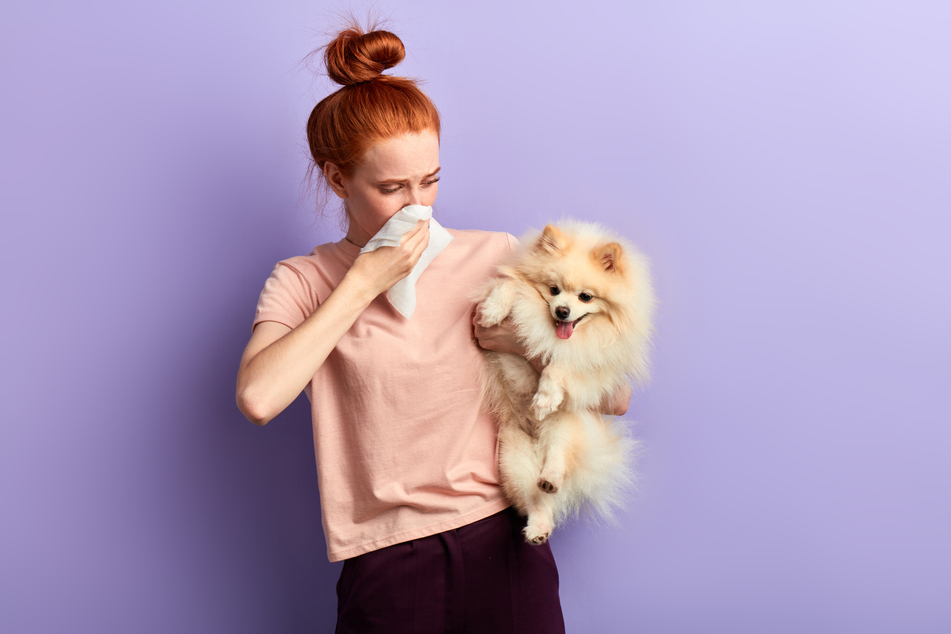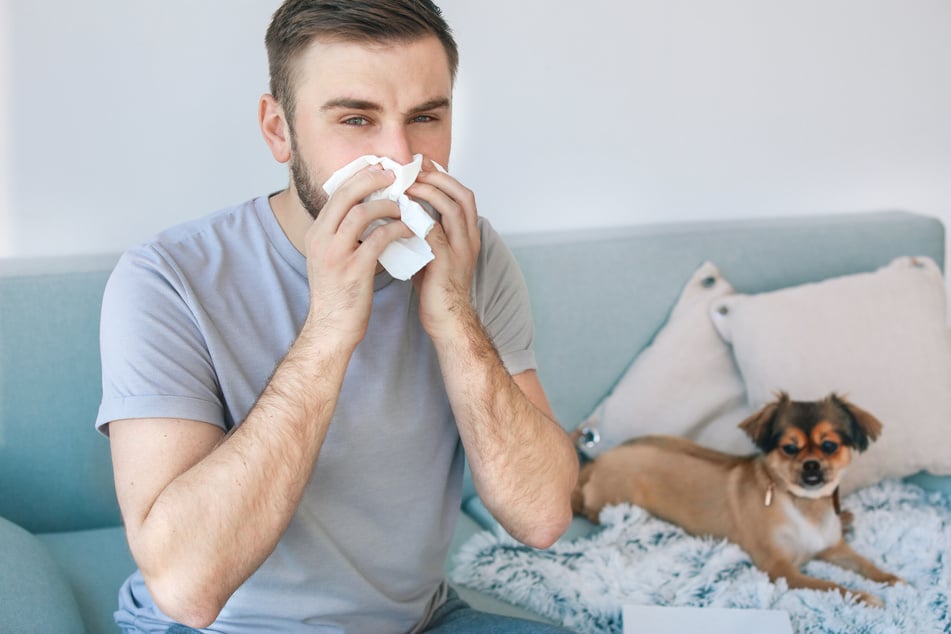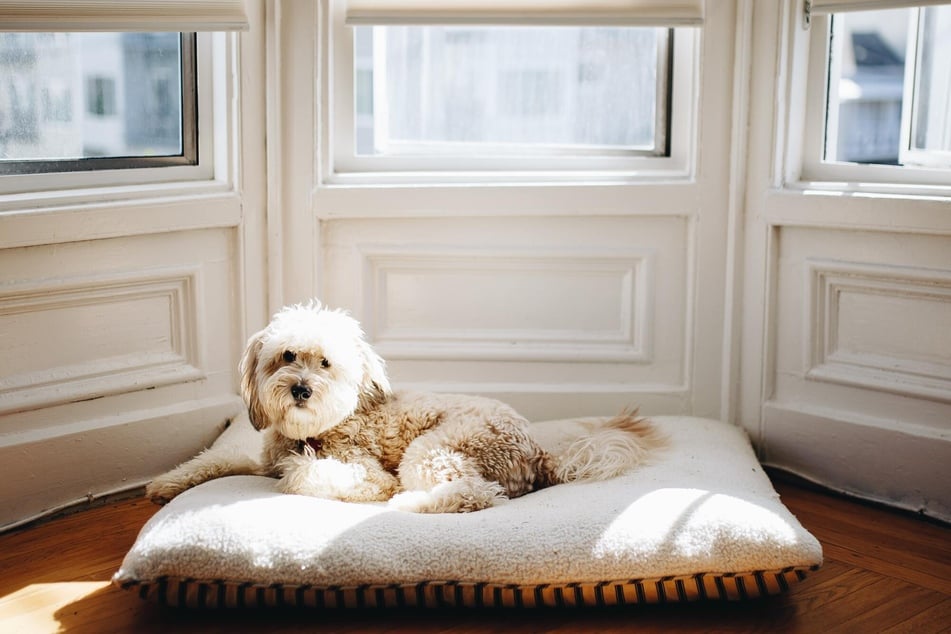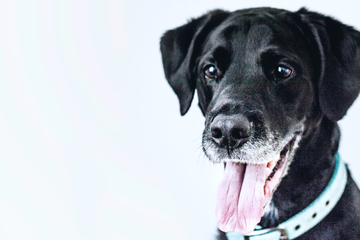Dog allergies: Symptoms, treatments, and the best dogs for people with allergies
Are you absolutely in love with man's best friend, but are utterly allergic to them? Luckily for you, with a few helpful tips and tricks, you'll be able to adopt a dog despite your allergies.

Dogs are some of the most popular pets in the world, but to some, they bring nothing but the sniffles.
The great tragedy, though, is that many people absolutely adore doggos despite allergies that make their respiratory system blow up like a balloon.
In this dog guide, TAG24 will take you through the symptoms and treatments of dog allergies, and if you have an allergy, which dog breeds might be best for you.
Allergies to dogs: Symptoms
For many people, even being in the mere presence of dogs can cause some pretty nasty allergic reactions.
Here are some dog allergy symptoms to look out for:
- Sneezing and coughing
- Irritation in the respiratory tract
- Runny nose
- Watery, itchy, and burning eyes
- Difficulty sleeping
- Headaches
- Dizziness
- Itchiness of the skin
- Rash on the skin
- Asthma
Dog allergies spread mainly through saliva, urine, and secretions from your dog's skin glands. Of course, they can also be triggered by dog fur and, as a result, transferred through the air.
Important: If you have really severe dog allergies, it is best to avoid adopting a pooch altogether, as they can sometimes cause long-term side effects.
Can you suddenly get a dog allergy?
Dog allergies are not exclusively inherited at birth, and sudden dog allergies can actually develop during adulthood. As a result, some people who have been fine their entire life can start to notice symptoms even years down the line of dog ownership. If symptoms develop, try spending some time away from dogs and seeing if the issues clear up or lessen.

Best dogs for people with allergies
Despite there being no truly anti-allergy dogs, certain breeds are definitely better for those who are allergic than others. If you suffer from being around dog fur, your best bet is a pooch that doesn't shed too much and isn't subject to those dreaded seasonal coat changes.
Here are some suggestion for dog breeds for people with allergies:
- Poodle
- Labradoodle
- Goldendoodle
- Maltese
- Yorkshire Terrier
- Bichon Frisés
- Portuguese Water Dogs
Just so you know: Certain allergy symptoms only occur when subjected to particular kinds of dog fur. Go to your doctor and have an allergist shed light on this.
Worst dogs for people with allergies
The answer to which dogs trigger allergies the worst is actually pretty simple: Any dog that sheds a lot of hair, has heavy fur, and has a seasonal shedding period. If you have a dog allergy, your eyes could blow up like a tomato, and you'll be sneezing all over the place if you don't avoid these pups.
Here are some particularly bad breeds. of dogs for people with allergies to be around:
- Corgis
- Golden Retriever
- Chow Chow
- Newfoundland
- German Shepherd
- Dachshund
- Pomeranian
Pekingese
Please remember: This isn't an exhaustive list, and there may be many other dog breeds that set your allergies off. It's best to talk to a vet and a doctor about this, and maybe test out a few of your friend's dogs before adopting your own.
How to treat dog allergies
Dog allergies need to be treated relatively carefully, as you don't want to exacerbate the symptoms. The most important step is to make your environment as allergen-free as possible. Other important factors, though, include issues of hygiene.
Here are some good ways to treat dog allergies:
- See a doctor as soon as possible and inquire about possible medications that can help to alleviate your symptoms.
- Make sure to only wear your clothes once in between washes, especially if you have a habit of cuddling and playing with your pooch.
- Shower and wash your hair daily to ensure that any animal hair or secretions are not taken with you wherever you go. Do so at nighttime so that these contaminants don't end up in your bed.
- Always wash your hands thoroughly after every pup petting or play session, as symptoms will naturally accumulate when you spend time with dogs.
- Never touch your face or rub your eyes after coming into contact with a dog, at least until you have washed your hands.
With some luck and using these tricks, you can potentially eliminate mild dog allergy symptoms using these precautions. As always, see your doctor for personalized medical advice.
Home remedies for dog allergies
One of the biggest steps that you can take is to allergy-proof your home, identifying all the "allergen carriers" and taking appropriate measures. This can be a long and complicated process, but can do a great deal if you are looking to treat your dog allergies.
Here are a number of tips to help you dog allergy-proof your home:
- Tip 1: Wipe surfaces - It is a great idea to wipe down all the surfaces in your house with a damp cloth or antibacterial wipe or spray at least once a week, removing any dust and dog-related particles from your immediate environment.
- Tip 2: Clean textile furniture - Each and every month, you should give your big pieces of furniture a thorough cleaning. That means using a steam cleaner to make your couches, armchairs, or whatever else you sit on allergy-free.
- Tip 3: Dog-free zones - To prevent dog hair from spreading throughout your entire home, make sure that there are one or two dog-free zones to escape to. Especially important is your bedroom, as you need to make sure that you can sleep in peace and without allergic reactions.
- Tip 4: Wash everything - Make sure to wipe down all of your dog's belongings on a regular basis. That means wiping out your dog's basket and cleaning any toys it may have.
- Tip 5: Vacuuming - Vacuum your entire home at least once a week, preferably twice. Dog hair and particles accumulate as part of your home's dust, and need to be removed regularly.
- Tip 6: Dog blankets for the sofa - Get your dog a nice, heavy dog blanket for the couch. Use this whenever your dog wants to sit there, protecting it from any allergenic particles that may come out of your pooch.
- Tip 7: Regular airing out and ventilating - Make sure that you are regularly airing out and ventilating your home, to replace any stale air that may have accumulated allergenic particles.
Please remember: Many of these methods are not a long-term solution. It's important for those with allergies to make your home is clean. This may help to prevent or lessen bad allergic reactions, but will not get rid of them completely.

Can you build up an immunity to dog allergies?
Dog allergies are certainly complicated, and vary from person to person. Some people will actually experience worsening allergies after getting a dog, and others will slowly get better and develop a sort of "immunity".
There is no miracle cure for dog allergies, but after extensive exposure, your body can sometimes develop a tolerance to certain allergens.
What happens is that your body shows fewer symptoms, but isn't necessarily over the allergies themselves. It simply depends on what that allergen is, and your body's response to it.
In summary: you could build an immunity to dog allergies, but most likely, you won't.
Don't let allergies stop you from getting a dog!
Before deciding against adopting a four-legged friend simply because you get the sniffles every now and again, go and see your doctor. Get those allergies checked out, seek medical advice, and then make your decision. Self-diagnoses are never a great idea and, in this case, could prevent you from having an absolutely wonderful pet.
In the end, dog allergies have some pretty nasty symptoms, but there are treatments available and - most of all - a lot of joy to be had when being around a pup.
Cover photo: 123RF / ufabizphoto



